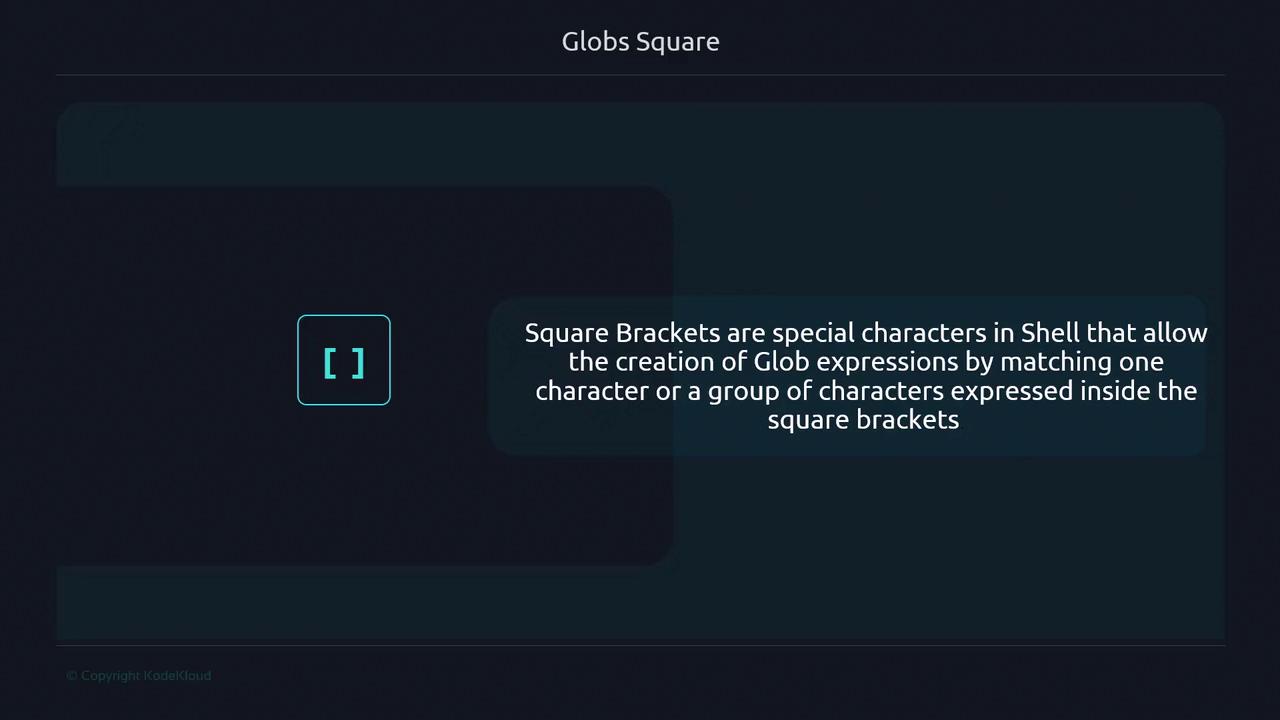Advanced Bash Scripting
Globs
Square
Shell globbing lets you match filenames using patterns. While * matches any string and ? matches a single character, square brackets ([ ]) define character classes, enabling you to match one character from a specific set or range.
Matching a Range of Characters
Given a directory:
$ ls
fileA fileB fileC fileD fileE
You can match only fileA, fileB, and fileC by specifying a range inside brackets:
$ ls file[A-C]
fileA fileB fileC
Here, [A-C] matches any uppercase letter from A through C. Note that the dash (-) defines a range and must go from lower to higher:
$ ls file[C-A]
ls: cannot access 'file[C-A]': No such file or directory
Common Examples
| Pattern | Matches | Description |
|---|---|---|
| file[A-C] | fileA, fileB, fileC | Uppercase A–C |
| file[a-c] | filea, fileb, filec | Lowercase a–c |
| file[1-3] | file1, file2, file3 | Numeric 1–3 |
| file[ACE] | fileA, fileC, fileE | Specific letters A, C, E |
Negated Character Classes
Prefix ! or ^ inside brackets to exclude characters or ranges:
$ ls
fileA fileB fileC fileD fileE
$ ls file[^A-C]
fileD fileE
$ ls file[!A-C]
fileD fileE
Note
In Bash both ! and ^ work for negation. POSIX shells require ! at the start of the class.

Listing Specific Characters
To match non-consecutive filenames such as fileA, fileC, and fileE, simply list them:
$ ls file[ACE]
fileA fileC fileE
Case Sensitivity
Globbing in Bash is case sensitive. If you have both uppercase and lowercase files:
$ touch filea fileb filec filed filee
$ ls
fileA fileB fileC fileD fileE filea fileb filec filed filee
To match only lowercase:
$ ls file[a-c]
filea fileb filec
To remove both lowercase and uppercase a–e, combine ranges:
$ rm file[a-eA-E]
$ ls
fileD fileE
Note
When mixing ranges, list them in the order you want matched: here a-e before A-E.
Numeric Ranges and Negation
Numeric ranges behave the same way:
$ touch file1 file2 file3 file4 file5
$ ls file[1-3]
file1 file2 file3
$ ls file[4-5]
file4 file5
$ ls file[^1-3]
file4 file5
$ ls file[!1-3]
file4 file5
Multiple Character Classes
You can chain classes to match multiple positions. For example, to match filea1, filea2, fileb1, fileb2:
$ touch filea1 filea2 filea3 fileb1 fileb2 fileb3
$ ls file[a-b][1-2]
filea1 filea2 fileb1 fileb2
Each [a-b] matches one letter, and [1-2] matches one digit. If you try only [1-2], it won’t match because the letter is missing:
$ ls file[1-2]
ls: cannot access 'file[1-2]': No such file or directory
Literal Characters Inside Brackets
Inside character classes, special glob characters lose their meaning:
$ ls file[a][*]
ls: cannot access 'file[a][*]': No such file or directory
To use * as a wildcard, place it outside the brackets:
$ ls filea*
filea1 filea2 filea3
Or constrain both positions:
$ ls file[a][1-3]
filea1 filea2 filea3
Globbing vs. File Creation
Globs match existing filenames; they do not generate names. If you use a glob in a command like touch when no files match, the pattern is taken literally:
$ touch ?ail
$ ls
'?ail'
To produce a series of filenames based on a pattern, consider using brace expansion instead of globs.
Warning
Globbing won’t create files—only match them. If you expect new files, use brace expansion or a loop.
Links and References
Watch Video
Watch video content
Practice Lab
Practice lab